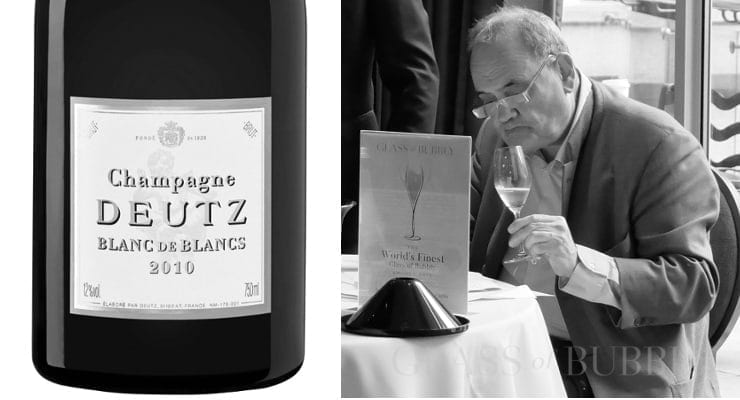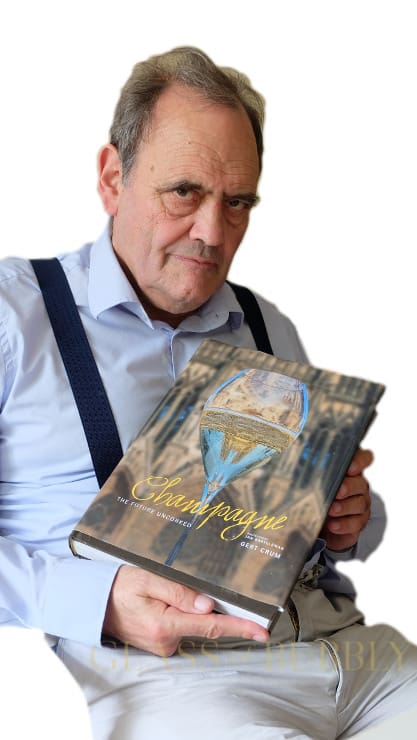Michael Edwards enjoys a glass of The World’s Finest Glass of Bubbly over some Q&A’s
23rd July 2018

Though the wine world currently seems to be somewhat crowded with wine connoisseurs and experts, there is still a select few individuals that command the greatest of respect within the industry of Champagne and Sparkling Wine, one being Michael Edwards, a regular face at invited Champagne tastings and press tours. Michael was once the chief inspector of the Egon Ronay guide along with being a respected author of Champagne with one of his well known and loved titles being The Finest Wines of Champagne (2009) – I have a copy myself and it is a most engaging book that certainly seems not to age, very factual in content and enlightening in how it describes some of the well know houses of this famous wine region.
I decided to take a bottle of Champagne Deutz Blanc de Blancs 2010 which won the title of The World’s Finest Glass of Bubbly for 2017 and during a relaxing afternoon down in London, ask Michael some questions on where we are currently with Champagne and sparkling wines – Firstly, Michael’s notes on the Blanc de Blancs 2010 which also won his very own award during the judging ‘The Michael Edwards Award‘ and a trophy for ‘Meditation‘:
Champagne Deutz Blanc de Blancs 2010 – Michael Edwards tasting notes: “A good straw colour which suggests a lot of structure and usage of grand cru grapes. Quite firm and gives a sense of substance. Citrus fruits, lemon/lime, grapefruit, good acidity and a nice balance – pure flavours, no wood notes. 2010 was a challenging year though turned out good for Chardonnay – This wine attacks the palate. There is a touch of bitterness, it sounds bad though it is not as it brings the wine together and gives it an edge – A very good food wine such as for salmon, trout, Dover sole. A worthy winner, a very good wine.”
Now on to our Q&A section:
Has the industry changed in the last 10 years?
“A lot. There has been an increased interest in vine tending and viticulture / sustainable viticulture. Care of vineyards takes a greater importance these days, led by the CIVC, we are seeing much more attention paid to environmental awareness. I see grower houses and Co-op’s really leading a reform in looking after their vineyards thus we are seeing an improvement in quality of taste and flavours. Maybe more so over the last 20 years, but dosage has decreased down to a level of 9% and less on average compared to 12%.”
How does the surge of cheap Champagne on the market, such as under £10 promotions we sometimes see at Aldi / Lidl, effect its overall value?
“I must say that I have not tasted them in detail, though those which I have are quite decent, not great, but very palatable nonetheless.”
Does £10 a bottle promotion degrade the value of Champagne though?
“Degrade is too strong a word. Reduces possibly in that it reduces the possibility of making some good Champagne as a decent Champagne needs at least 2 – 3 years on the less whereas cheaper Champagne will just stick to the minimal requirements of 15 months in the bottle.”
If you could choose one Champagne house to visit and enjoy say a vertical tasting – where would that be?
“It is a bit hard for me to pinpoint one, though if you want to get a real feeling of Champagne one of the best starting points is with Veuve Clicquot. It is a most serious house and committed to quality of wines despite being one of the biggest producers annually.
If we look at Co-ops then Union de Champagne is also great to visit despite its size – Their wines are wonderful. Another great Co-op is that of Le Mesnil.
A different experience and approach to Champagne making can be had at Claude Giraud (Henri Giraud) – unusual and great wines. Just up the road you can also explore the Champagne of Phillipe Brun, a great character of the industry and once again, some of the best Champagne of the region.
Opposite Champagne Bollinger you will find Gosset Brabant who are well worth a visit.
Another independent brand is Joseph Perrier who I do enjoy the wines of.”
OK, Michael, your experience of Champagne houses means you have so many wonderful experiences, but what about offering our readers one house you’d suggest to visit?
“Well then for me I would run with Taittinger. They have both very good wines and a great friendly attitude to their guests. Their fabulous Comtes de Champagne I really enjoy.”
If we move to other traditional method areas outside of Champagne, where would you say we should be taking note of?
“For me, the Trento and Franciacorta region produces the best wines to compete with Champagne. The land of the Trento region is special, North of Verona and set within the foothills and mountains of the Alps – They are producing some serious classic sparkling wines with Ferrari Trento being the greatest of producers from this region (vineyards sit at altitudes of up to 800m).”
How about non-traditional / Charmant method Michael – What are your thoughts?
“I certainly have nothing against it for in most occasions it is well done. Of course, it is something different altogether as they are focused on the primary fruits and you get no complexity that you do from ageing – I do recognise that some Charmant methods such as Prosecco DOCG will use ageing.”
So Prosecco?
“I think it is a phenomenon. It has obviously an appeal as it is simple and easy for people to enjoy. The price point can be very decent, those of the flat area (DOC) can be quite ordinary. The best come from the Prosecco Superiore (DOCG regions of Asolo & Conegliano-Valdobbiadene) where vineyards and producers are mostly set within the attractive steep foothills that make the region so attractive.”

You are an author, though I know you are always keen to promote other authors too – Can you recommend any books that our readers should look at purchasing that are focused on Champagne?
“By far the best book this year for me is Gert Crum’s ‘Champagne, the future uncorked’. Why is he such a good author? He was an academic teaching sociology so what flows from that is that he is meticulously detailed in his facts and details. He does not hide facts, he is critical and writes in a conversational way. Being Dutch, he has a typical Dutch common sense – There is no substitute for memory and experience – He is a wine lover and you can tell that from his writing.“
![]()
Christopher Walkey
Co-founder of Glass of Bubbly. Journalist and author focused on Champagne & Sparkling Wines and pairing them with foods.
